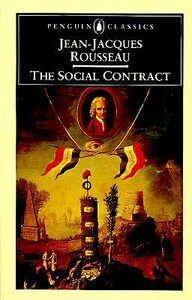Take a photo of a barcode or cover
Someone please remind me why exactly this is considered an important book
challenging
medium-paced
Differences with Locke's 2nd Treatise of Government
Idea of the Soverign and State.
Man is at maximum liberty when they renounce it to the state.
Brief description of Roman political bodies
Locke is more concerned with refuting justifications for monarchy, most notably for Filmer
Rosseau focuses more on government types and how they are suited to different circumstances.
Idea of the Soverign and State.
Man is at maximum liberty when they renounce it to the state.
Brief description of Roman political bodies
Locke is more concerned with refuting justifications for monarchy, most notably for Filmer
Rosseau focuses more on government types and how they are suited to different circumstances.
inspiring
reflective
fast-paced
challenging
informative
reflective
slow-paced
The Social Contract contains some great ideas and interesting viewpoints, but I must admit that a lot of what he explains to us in the novel does seem to idealistic and unrealistic as a political treatise today. Though I do enjoy some of Rousseau's thoughts and ideas regarding the perfect democracy and how we can achieve the least amount of governmental corruption, I do think that this book does leave a lot unexplained and even contains some ideas that are straight totali-Machiavell-ian. I also personally did not find this to be enjoyable read, with me admittedly skipping a lot of the rants about ancient Roman political structures amongst other similar ideas.
This wasn't my favorite from Rousseau. A lot of the things I enjoyed about him in the Discourses kinda disappeared in the Social Contract. I could feel him getting more conservative as I read on and I particularly dislike his stance on women.
I found this to be a lot more ideologically consistent than Hobbes and Locke until the final chapter. A lot of really good ideas and observations which I don’t think are idealistic. For one he is both optimistic about humanity’s potential to pursue equality and also realistic about individual inclinations that deviate from this goal. The separation of executive and legislative was well defined but if he wanted to make civic religion the glue to it all it should have been given a similarly nuanced conversation that shows how its tyrannical inclinations will be subdued. Maybe he outlines this further in another text but he could have discussed the Roman empire less and fleshed out that last argument. Also a 4 line conclusion for a 100 page book is SO REAL he’s just like me fr. Also, the paradox of forcing someone to be free is crazy and interesting and I will be thinking that over.
challenging
informative
“As soon as public service ceases to be the main concern of the citizens and they come to prefer to serve the state with their purse rather than their person, the state is already close to ruin.”
“frequent punishments are a sign of a weakness or slackness in the government. There is no man so bad that he cannot be made good for something. No man should be put to death, even as an example, if he can be left to live without danger to society.”
“frequent punishments are a sign of a weakness or slackness in the government. There is no man so bad that he cannot be made good for something. No man should be put to death, even as an example, if he can be left to live without danger to society.”
“In a well-governed state few are punished, not because there are many pardons but because there are few criminals.”
challenging
informative
reflective
slow-paced
challenging
reflective
slow-paced





